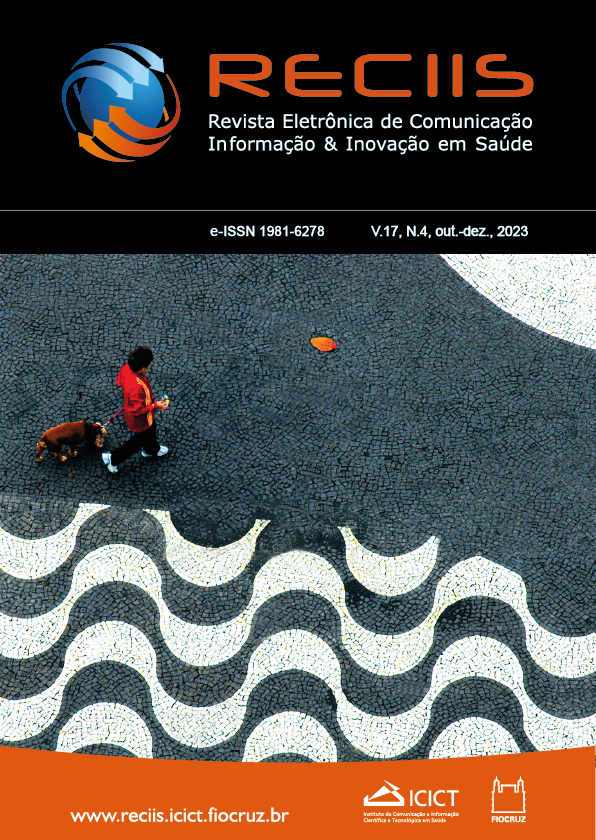Learning and teaching in a circular and non-totalitarian way: essays in ethnoeducation with quilombolas in the Amazon region
DOI:
https://doi.org/10.29397/reciis.v17i4.3790Keywords:
Etnoeducação, Ser coletivo, Quilombo, Aprender e ensinar, Oriximiná – PAAbstract
We intend to discuss the experience in ethnoeducation, which we built with the Nossa Senhora da Aparecida school, located in the quilombola community Boa Vista Cuminã, in the region of Oriximiná (PA). We started from the background of a group of extension, research and intervention in ethnoeducation at the Universidade Federal Fluminense, which, for eight years, developed experiences of collective formation of multiple educators. Ethnoeducation is inspired by ethnography as a methodology for activating community and collective devices for teaching and learning with. In this process, transdisciplinarity breaks hierarchical and disciplinary positions of the spaces for teaching and learning in the “school”, in community life, and boosts the protagonism of the “agencies”, individual and collective, at play in these ethnoeducation actions. We will seek, at the end of this article, to report a collective teaching and learning experience in the quilombola community of Boa Vista Cuminã.
References
ALVAREZ, Johnny. O aprendizado da capoeira angola como um cultivo na e da tradição. 227 f. 2007. Tese (Doutorado em Psicologia) – Instituto de Psicologia, Universidade Federal do Rio de Janeiro, 2007. Disponível em: https://xdocz.com.br/doc/o-aprendizado-da-capoeira-angola-como-um-cultivo-na-e-da-tradiao-johnny-menezes-alvarez-987711pegq8z. Acesso em: 6 nov. 2023.
BAKHTIN, Mikhail. Marxismo e filosofia da linguagem: problemas fundamentais do método sociológico da linguagem. São Paulo: Hucitec, 1992.
BENJAMIN, Walter. O narrador: considerações sobre a obra de Nikolai Leskov. In: BENJAMIN, Walter. Magia e técnica, arte e política: ensaios sobre literatura e história da cultura. Tradução: Sérgio Paulo Rouanet. 7. ed. São Paulo: Ed. Brasiliense, 1994. xx-xx. (Obras escolhidas, v. 1).
CASCUDO, Luís da Câmara. Dicionário do folclore brasileiro. 6. ed. Belo Horizonte: Itatiaia, 1988.
CLASTRES, Pierre. A fala sagrada: mitos e cantos sagrados dos índios Guarani. Tradução: Nícia A. Bonatti. Campinas: Papirus, 1990.
FUNES, Eurípedes A. Comunidades mocambeiras do Trombetas. In: GRUPIONI, Denise Fajardo; ANDRADE, Lúcia M. M. de. (org.). Entre águas bravas e mansas: índios & quilombolas em Oriximiná. São Paulo: Comissão Pró-Índio de São Paulo: Iepé, 2015. p. 16-61. Disponível em: https://cpisp.org.br/wp-content/uploads/2016/09/CPISP_pdf_EntreAguasBravaseMansas.pdf. Acesso em: 7 nov. 2023.
GRUPIONI, Denise Fajardo; ANDRADE, Lúcia M. M. de. Apresentação. In: GRUPIONI, Denise Fajardo; ANDRADE, Lúcia M. M. de. (org.). Entre águas bravas e mansas: índios & quilombolas em Oriximiná. São Paulo: Comissão Pró-Índio de São Paulo; Iepé, 2015. p. 8-15. Disponível em: https://cpisp.org.br/wp-content/uploads/2016/09/CPISP_pdf_EntreAguasBravaseMansas.pdf. Acesso em: 7 nov. 2023.
MESTRE. In: FERNANDES, Francisco; LUFT, Celso Pedro; GUIMARÃES, F. Marques. Dicionário brasileiro Globo. 30. ed. São Paulo: Globo, 1993. p. 455.
PASSOS, Eduardo. A construção da clínica comum e as áreas profissionais. In: CAPOZZOLO, Angela Aparecida; CASETTO, Sidnei José; HENZ, Alexandre de Oliveira (orgs.). Clínica comum: itinerários de uma formação em saúde. São Paulo: Hucitec Editora, 2013. p. 213-228.
PASSOS, Eduardo; BARROS, Regina Benevides de. A cartografia como método de pesquisa-intervenção. In: PASSOS, Eduardo; KASTRUP, Virgínia; ESCÓSSIA, Liliana da. (orgs.). Pistas do método da cartografia: pesquisa-intervenção e produção de subjetividade. Porto Alegre: Sulina, 2009. p. 17-31.
RUSSI, Adriana; ROCHA, Gilmar (org.). Inventário do artesanato tradicional de Oriximiná: catálogo. Niterói: [s. n.], 2012.
SANTOS, Antônio Bispo dos. Colonização, quilombos: modos e significações. Brasília, DF: INCTI: UnB, 2015.
SAUMA, Julia Fratjtag. Ser coletivo, escolher individual: território, medo e família nos rios Erepecuru e Cuminã. In: ENCONTRO ANUAL DA ASSOCIAÇÃO NACIONAL DE PÓS-GRADUAÇÃO E PESQUISA EM CIÊNCIAS SOCIAIS, 33., 2009, Caxambu. Anais [...]. Caxambu, MG: Anpocs, 2009.
UNIVERSIDADE FEDERAL FLUMINENSE (UFF). Etnoeducação. Niterói: Universidade Federal Fluminense, c2023. Disponível em: http://patrimoniocultural.uff.br/etnoeducacao/. Acesso em: 6 nov. 2023.
VIVEIROS DE CASTRO, Eduardo. Metafísicas canibais: elementos para uma antropologia pós-estrutural. São Paulo: Cosac Naify, 2015.
WEIL, Simone. O enraizamento. Bauru: EDUSC, 2001.
Downloads
Published
How to Cite
Issue
Section
License
Copyright (c) 2023 Johnny Menezes Alvarez

This work is licensed under a Creative Commons Attribution-NonCommercial 4.0 International License.
Author’s rights: The author retains unrestricted rights over his work.
Rights to reuse: Reciis adopts the Creative Commons License, CC BY-NC non-commercial attribution according to the Policy on Open Access to Knowledge by Oswaldo Cruz Foundation. With this license, access, download, copy, print, share, reuse, and distribution of articles is allowed, provided that it is for non-commercial use and with source citation, granting proper authorship credits and reference to Reciis. In such cases, no permission is required from the authors or editors.
Rights of authors’s deposit / self-archiving: The authors are encouraged to deposit the published version, along with the link of their article in Reciis, in institutional repositories.












